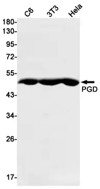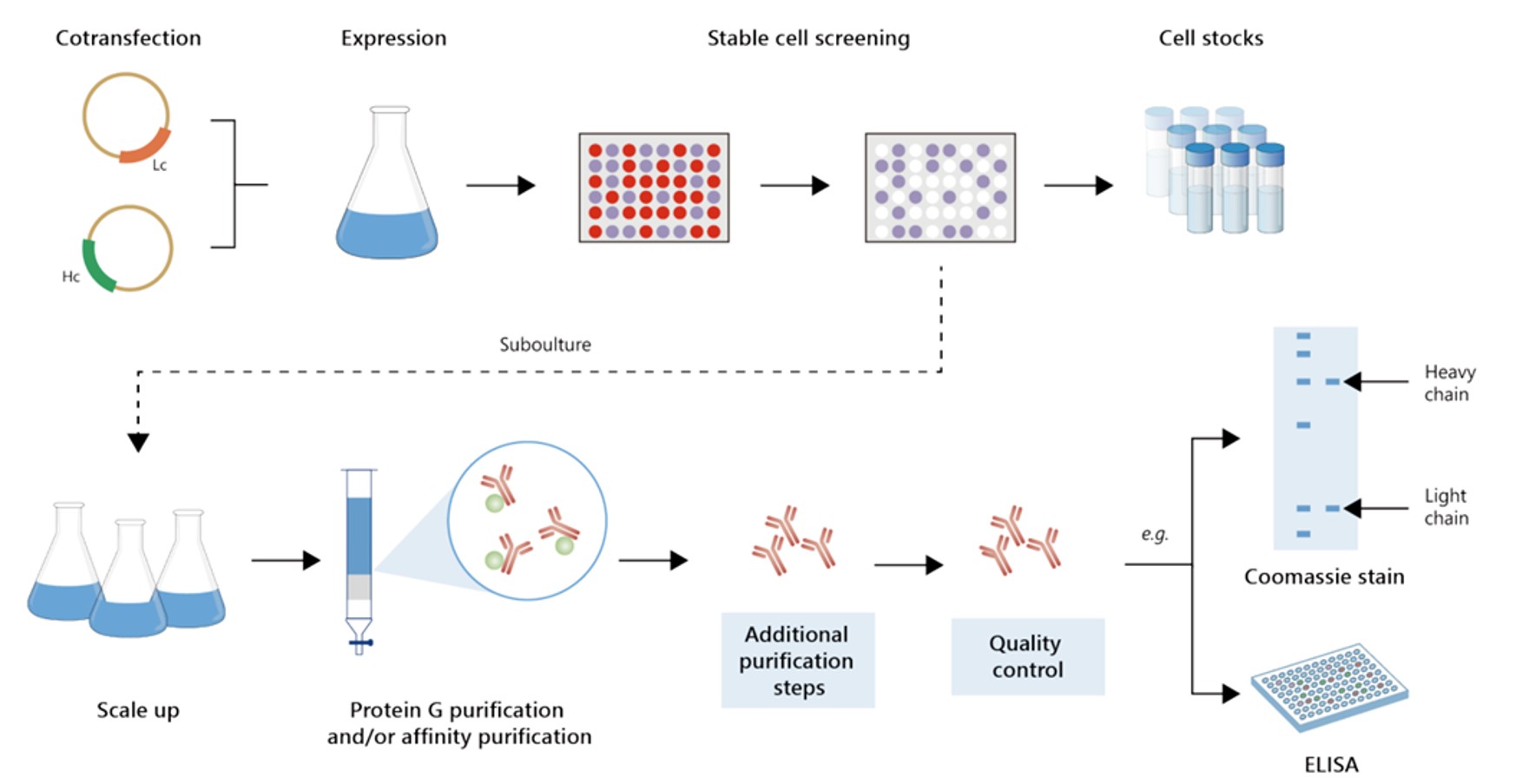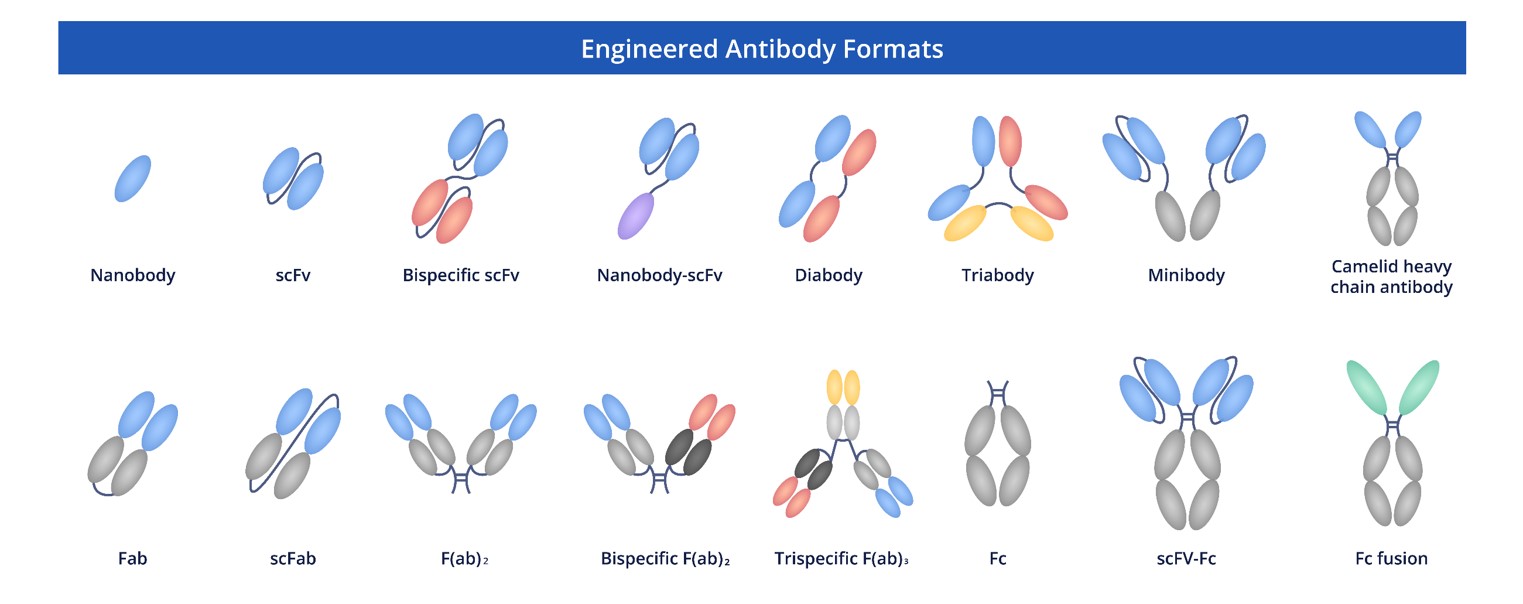Anti-PGD Recombinant Antibody Products
 Loading...
Loading...Anti-PGD Products
 Loading...
Loading...-
- Derivation: Mouse
- Species Reactivity: Human
- Type: Mouse IgG1, κ
- Application: WB, IP, IF, ELISA
- Recombinant Rabbit Anti-PGD Antibody (clone R02-7C6) (VS3-FY1129)
-
- Species Reactivity: Human, Mouse, Rat
- Type: Rabbit IgG
- Application: WB, ICC, IF, IP
- Anti-PGD Immunohistochemistry Kit (VS-0525-XY5342)
-
- Species Reactivity: Human
- Target: PGD
- Application: IHC
- Anti-Mouse PGD Immunohistochemistry Kit (VS-0525-XY5343)
-
- Species Reactivity: Human, Mouse, Rat
- Target: PGD
- Application: IHC
-
- Derivation: Phage display library screening
- Species Reactivity: Human
- Type: IgG
- Application: WB, ICC, IP, FC
Can't find the products you're looking for? Try to filter in the left sidebar.Filter By Tag
Our customer service representatives are available 24 hours a day, from Monday to Sunday. Contact Us
For Research Use Only. Not For Clinical Use.
Creative Biolabs delivers premium recombinant antibody solutions targeting PGD, engineered to drive breakthroughs in biomedical investigations. Leveraging our advanced proprietary platforms, we guarantee rigorously validated products that consistently exceed industry benchmarks for specificity and reproducibility. Beyond supplying these high-performance reagents, we offer comprehensive scientific support throughout your project lifecycle - from experimental design to data interpretation. Our expanding catalog features meticulously optimized antibody formulations that balance cost-efficiency with outstanding experimental performance. Partnering with us provides access to both tailored scientific tools and collaborative expertise designed to overcome complex research challenges efficiently.
PGD: A Key Metabolic Regulator in Cancer Neurodegeneration and Inflammatory Diseases
PGD serves as a critical enzyme in the pentose phosphate pathway, with emerging significance across multiple disease pathologies. In oncology, its upregulated activity promotes NADPH generation, fueling tumor growth and chemoresistance through redox balance maintenance and nucleotide biosynthesis. Metabolic disorders like diabetes demonstrate altered expression patterns, contributing to insulin resistance via oxidative stress modulation. The enzyme's role in glutathione metabolism connects it to neurodegenerative conditions, where impaired antioxidant defenses accelerate neuronal damage in Alzheimer's and Parkinson's diseases. Inflammatory processes are similarly affected, with dysregulated activity exacerbating rheumatoid arthritis through macrophage activation and pro-inflammatory cytokine production. Hematological applications reveal its importance in erythrocyte homeostasis, with deficiencies linked to hemolytic anemia susceptibility. Recent studies also implicate this target in pulmonary hypertension pathogenesis through vascular remodeling mechanisms. The breadth of its involvement in fundamental metabolic and inflammatory pathways positions it as a compelling therapeutic candidate, particularly for conditions where redox imbalance, proliferative signaling, or chronic inflammation drive disease progression. Small molecule modulators and genetic approaches targeting this pathway show promise in preclinical models across these diverse indications.
Alternative Names
Complement PGD; 6PGD; EC 1.1.1.44; Phosphogluconate Dehydrogenase; PGDH; 6-Phosphogluconate Dehydrogenase, Decarboxylating
Background
6-phosphogluconate dehydrogenase is the second dehydrogenase in the pentose phosphate shunt. Deficiency of this enzyme is generally asymptomatic, and the inheritance of this disorder is autosomal dominant. Hemolysis results from combined deficiency of 6-phosphogluconate dehydrogenase and 6-phosphogluconolactonase suggesting a synergism of the two enzymopathies. Several transcript variants encoding different isoforms have been found for this gene.
Enzymes, Metabolic proteins, Plasma proteins
Intracellular
Cell type enhanced (Squamous epithelial cells, monocytes)
Group enriched (eosinophil, basophil, neutrophil, classical monocyte)
Cell line enhanced (A549)
Homodimer.
Oxidoreductase
Anti-PGD rAb Products
To facilitate rapid scientific progress, we provide rigorously validated anti-PGD recombinant antibodies that combine exceptional specificity with cost-effectiveness, complemented by comprehensive technical consultation to optimize your experimental outcomes.
Table 1. Featured anti-PGD recombinant antibody products at Creative Biolabs.
| Cat. No. | Product Name | Target Species | Host Species | Applications |
| VS3-FY1129 | Recombinant Rabbit Anti-PGD Antibody (clone R02-7C6) | Human; Mouse; Rat | Rabbit | WB; ICC; IF; IP |
| MOB-3932z | Mouse Anti-PGD Recombinant Antibody (clone 42B10) | Human | Mouse | WB; IP; IF; ELISA |
| MOR-2679 | Hi-Affi™ Recombinant Rabbit Anti-PGD Monoclonal Antibody (DS2679AB) | Human | Rabbit | WB; ICC; IP; FC |
Creative Quality Control
To accelerate biopharmaceutical innovation from discovery to market, we prioritize customer-centric solutions with an unwavering commitment to exceeding quality expectations. Our rigorous quality control framework ensures consistently superior products, while our proactive approach to addressing client needs streamlines developmental timelines, ultimately reducing time-to-market for critical therapeutics.
 Fig.1 WB analysis of anti-PGD antibody (Cat# VS3-FY1129, Creative Biolabs).
Fig.1 WB analysis of anti-PGD antibody (Cat# VS3-FY1129, Creative Biolabs).
Customer Reviews

Recombinant Rabbit Anti-PGD Antibody (clone R02-7C6) (CAT#: VS3-FY1129)

Mouse Anti-PGD Recombinant Antibody (clone 42B10) (CAT#: MOB-3932z)
rAb Production
With decades of specialized experience in antibody engineering and development, we consistently deliver premium recombinant antibodies through optimized production processes that ensure both exceptional performance and rapid turnaround times without compromising reliability.
Featured Anti-PGD Recombinant Antibody Production Platforms
Fig.2 Milligram-scale recombinant antibody production.
 Fig.3 Gram-scale recombinant antibody production.
Fig.3 Gram-scale recombinant antibody production.
rAb Modalities
Creative Biolabs specializes in developing premium engineered antibodies across diverse formats, leveraging advanced molecular design technologies to meet complex research requirements. Our expertise spans multiple antibody engineering platforms, supported by fully customizable development services that address unique experimental challenges while maintaining rigorous quality standards.
 Fig.4 Full Length Anti-PGD Recombinant Antibody Production and Modalities.
Fig.4 Full Length Anti-PGD Recombinant Antibody Production and Modalities.
For any inquiries about PGD or technical assistance with your experiments, please contact us by phone or email. Our expert scientific team is ready to provide personalized guidance and troubleshooting support to help optimize your research workflow and achieve reliable results.

